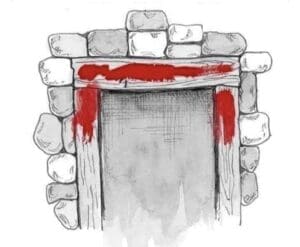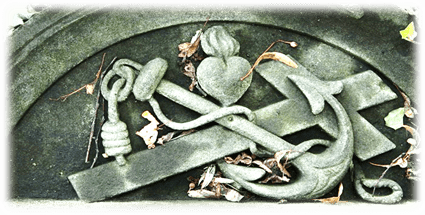In the first-century, the anchor was a symbol for hope and steadfastness for Christians suffering persecution. Anchors are found in many inscriptions in the catacombs of Rome, and they were worn by many Christians as a sign that their hope was in Christ alone. The source for this symbol is found in Hebrews 6:19,
“Which hope we have as an anchor of the soul, both sure and steadfast.”
=============================================================================
Old Testament Reading – Genesis 6:1-8
New Testament Reading – Romans 6:15-23
How Should We Then Live
“The Validation of Our Salvation” # 2
1 Peter 1:18-21
Pastor Wayne J. Edwards
Peter was writing to Christians facing severe persecution for their expressed faith in Jesus Christ as the Messiah.
- Rather than sympathize with their suffering, Peter told them to focus on their salvation and to rejoice that their faith had been found worthy to be persecuted.
- Peter encouraged them to think clearly about why they were being persecuted and to rest their hope on the grace that would be revealed to them when Jesus comes again.
In His Sermon on the Mount, Jesus told the multitude to love their enemies and so prove themselves to be “the sons of your Father in heaven.”
- God expects those whom He redeems to manifest a different view toward the world’s evildoers.
- In Ephesians 6, Paul said Christians are to fight against evil by:
- Putting on the whole armor of God by confessing all known sins and renewing our faith in Him.
- Praying in the power of the Holy Spirit against the evil powers.
- Praying for the salvation of those who are being used by Satan to be delivered from evil.
In 1 Peter 1:18, Peter used the word “redemption” to remind his readers how they had been saved, from what, and for whom.
- Salvation is a general term that describes the end result – we have been saved, we are being saved, and we will be saved.
- Redemption is a specific term that describes how our salvation was achieved.
- Sinners are lost and in bondage to sin; helpless and hopeless to deliver themselves from evil.
- Jesus said He came into the world to give His life a ransom for sinners.
- Therefore, the term redemption describes how God purchased our deliverance from sin through the death of Jesus, the only begotten Son of the Father.
In 1 Peter 1:13 – 2:3, Peter outlined three dimensions of a believer’s proper response to God’s gift of salvation, and He began with our response to God.
- In Hope – Vs. 13 – we are to consider ourselves temporary citizens of this world and fix our hope on the joy that will be ours when Jesus comes again.
- In Holiness – Vs. 15 – we are to do whatever is necessary to live up to our calling to “Pursue peace with all people, and holiness, without which no one will see the Lord.” Hebrews 12:14
- In Honor – Vs. 17-19 – we need to maintain a healthy fear of a holy God and give Him the glory and honor due His holy name.
In 1 Peter 1:18-20, Peter compared our redemption with Israel’s redemption from Egypt.
1. The Penalty for Rejecting God’s Means of Salvation is Death – Genesis 2:17, “In the day that you eat from the tree of knowledge of good and evil, you will surely die.”
- After God spoke the universe into being, for His glory, He also created man, male and female, in His image, to reflect His glory, warning them not to eat of the fruit of the tree of the knowledge of good and evil or they would surely die.
- While God allowed Adam and Eve to live after they sinned, He also allowed the process of physical death to begin. However, their spiritual death was immediate – they were eternally separated from God because of their sin.
- Therefore, we were all born with the sinful nature, separated from God forever, and under the curse of death, “for we all have sinned and fall short of the glory of God.” Romans 3:23
2. The Provision for God’s Means of Salvation is the Blood of an Acceptable Sacrifice.
- While not being obligated to save anyone, God provided a way of salvation for all who would believe in Him.
- God sent His own Son to pay the penalty we deserved for our sin. “Therefore, God is both the just and the justifier of the one who has faith in Jesus.” Romans 3:26
- The picture of our redemption is in God’s final plague on Egypt and His provision for His people to be saved from that plague of death.
- Joseph’s brothers sold him to slave traders who took him to Egypt, where he began as a slave. However, because of his ability to interpret dreams, Joseph was promoted to serve as the Prime Minister of Egypt, second only to Pharaoh.
- Because of a famine, Joseph’s family of 70 came to Egypt for food, and Pharaoh allowed them to live in the Land of Goshen.
- In fear of an uprising, a new King forced the Israelites to become slaves, but their population grew to over 2-million.
- After 400-years, God determined to deliver His people from the bondage to slavery and into the Promised Land.
- Even though God proved His power to him through a series of plagues, Pharaoh refused to let the Jews go free.
- God said He would bring one more plague upon Egypt – the death of the firstborn of every family.
- However, the Israelites were to take the blood of a lamb, put it on the two sides and the top of the door.

-
- Then, they were to gather in their homes, eat that roasted lamb with unleavened bread and bitter herbs. They were to eat in a hurry with their loins girded and with sandals on their feet. When the angel of death saw the blood, it would “Passover” that house.
- Each family had to have its own lamb – a one-year-old male lamb, without a blemish – a “type” of Christ.
- The lamb was selected on the 10th of Nissan but not slain until the 14th of Nissan – confirming the timing of Jesus’ coming to earth to be our Savior.
- The fire, the herbs, the unleavened bread were “types” or illustrations of our redemption and our relationship with Christ.
3. The Proof of Having Received God’s Provision of Salvation is a Life of Obedience – 1 Peter 1:14
- Obedient faith takes God at His word and acts upon it.
- According to Exodus 12:28, the Israelites did everything the lord commanded them to do.
- In Hebrews 11:28, the Bible says, “By faith Moses kept the Passover and the sprinkling of blood, so that He who destroyed the firstborn would not touch them.”
- Obedient faith is the only genuine faith.
- For the people to believe Moses spoke for God, they had to follow his directions completely.
- To not have applied the blood in the proper manner would have revealed the shallowness of their faith in God.
- Obedient faith is seen in the ongoing holiness of God’s people.
- The Passover pictures our salvation, for when we, by faith, apply the blood of Christ to our hearts, the debt of our sin is paid in full, and forever.
- As the Passover was followed by the Feast of Unleavened Bread, we must continue to cleanse our heart from all sin so we can be set apart for God’s use.
- Obedient faith passes the faith down to the next generation.
- In Exodus 12, God instructed the fathers to constantly explain the meaning of the Passover to their children.
- Perhaps the greatest weakness in the church today is the failure of fathers to assume their position as the spiritual leaders of their families and to explain the message of salvation to their children.
- Obedient faith results in God’s people possessing the wealth of the nations.
- The Israelites asked the Egyptians for articles of silver, gold, and clothing, and they were given, and they were later used for the tabernacle and the temple.
- Churches should not beg from the world to meet its needs.
- If a church obeys the Great Commission, God will give that church followers from every tongue, tribe and nation.
- Obedient faith is a one-time decision that is renewed and manifested daily.
- It took only one night to get Israel out of Egypt, but it took a long time to get Egypt out of Israel.
- Once we comprehend the price of our redemption, we cannot help but live our lives in obedience to Christ.







